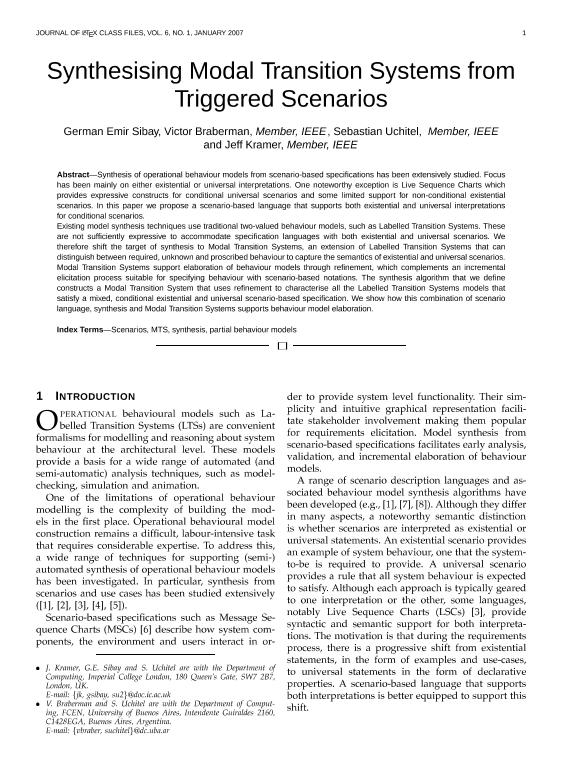Mostrar el registro sencillo del ítem
dc.contributor.author
Sibay, German Emir
dc.contributor.author
Braberman, Victor Adrian

dc.contributor.author
Uchitel, Sebastian

dc.contributor.author
Kramer, Jeff

dc.date.available
2015-10-26T14:01:12Z
dc.date.issued
2013-07
dc.identifier.citation
Sibay, German Emir; Braberman, Victor Adrian; Uchitel, Sebastian; Kramer, Jeff; Synthesizing Modal Transition Systems from Triggered Scenarios; Institute of Electrical and Electronics Engineers; IEEE Transactions on Software Engineering; 39; 7; 7-2013; 975-1001
dc.identifier.issn
0098-5589
dc.identifier.uri
http://hdl.handle.net/11336/2551
dc.description.abstract
Synthesis of operational behaviour models from scenario-based specifications has been extensively studied. Focus has been mainly on either existential or universal interpretations. One noteworthy exception is Live Sequence Charts which provides expressive constructs for conditional universal scenarios and some limited support for non-conditional existential scenarios. In this paper we propose a scenario-based language that supports both existential and universal interpretations for conditional scenarios. Existing model synthesis techniques use traditional two-valued behaviour models, such as Labelled Transition Systems. These are not sufficiently expressive to accommodate specification languages with both existential and universal scenarios. We therefore shift the target of synthesis to Modal Transition Systems, an extension of Labelled Transition Systems that can distinguish between required, unknown and proscribed behaviour to capture the semantics of existential and universal scenarios. Modal Transition Systems support elaboration of behaviour models through refinement, which complements an incremental elicitation process suitable for specifying behaviour with scenario-based notations. The synthesis algorithm that we define constructs a Modal Transition System that uses refinement to characterise all the Labelled Transition Systems models that satisfy a mixed, conditional existential and universal scenario-based specification. We show how this combination of scenario language, synthesis and Modal Transition Systems supports behaviour model elaboration.
dc.format
application/pdf
dc.language.iso
eng
dc.publisher
Institute of Electrical and Electronics Engineers

dc.rights
info:eu-repo/semantics/openAccess
dc.rights.uri
https://creativecommons.org/licenses/by-nc-sa/2.5/ar/
dc.subject
MTS
dc.subject
PARTIAL BEHAVIOR MODELS
dc.subject
SCENARIOS
dc.subject
SYNTHESIS
dc.subject.classification
Ciencias de la Computación

dc.subject.classification
Ciencias de la Computación e Información

dc.subject.classification
CIENCIAS NATURALES Y EXACTAS

dc.title
Synthesizing Modal Transition Systems from Triggered Scenarios
dc.type
info:eu-repo/semantics/article
dc.type
info:ar-repo/semantics/artículo
dc.type
info:eu-repo/semantics/publishedVersion
dc.date.updated
2016-03-30 10:35:44.97925-03
dc.journal.volume
39
dc.journal.number
7
dc.journal.pagination
975-1001
dc.journal.pais
Estados Unidos

dc.journal.ciudad
Lincoln
dc.description.fil
Fil: Sibay, German Emir. Imperial College London; Reino Unido
dc.description.fil
Fil: Braberman, Victor Adrian. Universidad de Buenos Aires. Facultad de Ciencias Exactas y Naturales. Departamento de Computación; Argentina. Consejo Nacional de Investigaciones Cientificas y Tecnicas. Oficina de Coordinacion Administrativa Ciudad Universitaria; Argentina
dc.description.fil
Fil: Uchitel, Sebastian. Universidad de Buenos Aires. Facultad de Ciencias Exactas y Naturales. Departamento de Computación; Argentina. Consejo Nacional de Investigaciones Cientificas y Tecnicas. Oficina de Coordinacion Administrativa Ciudad Universitaria; Argentina
dc.description.fil
Fil: Kramer, Jeff. Imperial College London; Reino Unido
dc.journal.title
IEEE Transactions on Software Engineering

dc.relation.alternativeid
info:eu-repo/semantics/altIdentifier/doi/http://dx.doi.org/10.1109/TSE.2012.62
dc.relation.alternativeid
info:eu-repo/semantics/altIdentifier/url/http://ieeexplore.ieee.org/xpl/articleDetails.jsp?arnumber=6311408
Archivos asociados
